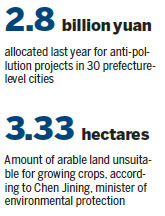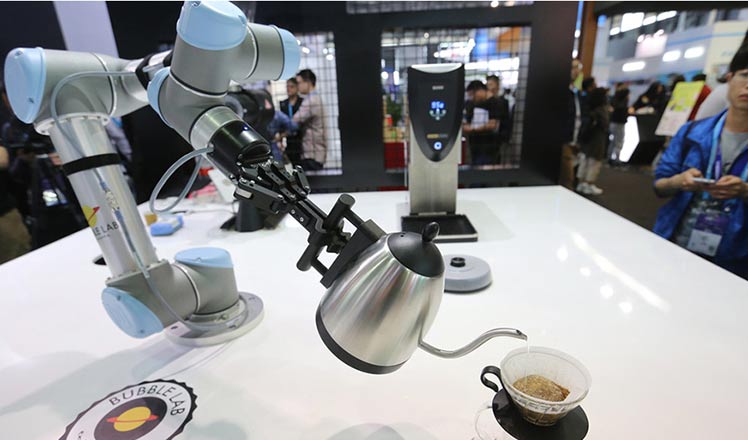China faces battle with soil pollution
Updated: 2016-05-13 07:34
By Xinhua(China Daily)
|
||||||||
Fight against contamination by heavy metals complicated by lack of funds and supervision
China is facing a hard battle against soil pollution as heavy metals, lack of funding and loose supervision stand in the way.
About 16.1 percent of land surveyed in China is polluted by heavy metals such as cadmium, arsenic, lead and mercury, according to figures from the Ministry of Environmental Protection and Ministry of Land and Resources.
In addition, 19.4 percent of surveyed arable land had levels of pollution higher than the national standard, according to Chen Jining, minister of environmental protection. That means about 3.33 million hectares of arable land are not suitable for growing crops.
Soil pollution by heavy metals is especially severe in China's central and southwestern areas, according to a 2014 report.
The pollution has contaminated crops, leading to health hazards and fueling environmental concerns.
In Baiyin, Gansu province, the 38-kilometer-long Dongdagou River was once the biggest source of pollution on the upper reaches of the Yellow River, with tens of millions of metric tons of heavy metal waste pouring into the Yellow River each year.
A test by Peking University found that the silt in the Dongdagou contained levels of cadmium that were 2,200 times the national standard, while mercury was 2,000 times higher.
"At first it was adults who were losing their teeth. Then it was children," said one resident. "Soon, even goats that ate the grass near the river began to lose teeth."
Last month, media outlets reported an alleged link between soil pollution and students' health in Changzhou, Jiangsu province. Blood samples taken from students at Changzhou Foreign Languages School reportedly showed abnormal readings after the children moved to the school's new campus near the former site of several chemical plants.
Due to waste from the past, a lack of money and supervision, soil pollution remains a big problem, said Qin Xiansheng, an environmental official in the Guangxi Zhuang autonomous region.
Last year, the central government allocated 2.8 billion yuan ($430 million) to help with antipollution projects in 30 prefecture-level cities, but experts say that was far from enough.
An official in Guangxi said many nonferrous metal companies don't dispose of the waste they produce, instead leaving it to pile up and cause potential pollution.
"Meanwhile, many officials do not know much about standards, equipment or waste treatment methods in the nonferrous metal industry, making supervision quite inefficient," said the official, who spoke on condition of anonymity.
However, one area is seeing good results in treating contaminated soil.
One of the country's most important areas with nonferrous metals, Guangxi's Huanjiang county, was once home to heavily polluted soil.
"In 2001, a huge flood crushed a mining company on the upper reaches of the local river, causing arsenic, lead and zinc to spill into crop fields near the river," said Qin Haifang, a farmer in Huanjiang.
"Experts from the Chinese Academy of Social Sciences came and spread lime powder and grew the arsenic-accumulating plant Pteris vittata, which largely reduced the heavy metal levels in the crops," said Qin.

(China Daily 05/13/2016 page3)
- First joint EU-China civil exercise begins in Shanghai
- Uncertainty over EU referendum vote impacts UK economy: Think-tank
- Canadian miner sells world's most expensive rough diamond for record $63 million
- German, Cuban FMs hold talks on bilateral cooperation
- Putin prevails in Sochi all-star ice hockey game
- US guided-missile destroyer visits Tonga

 Karst wonderland in Southwest China
Karst wonderland in Southwest China
 Love on the rubble: wedding stories after deadly quake eight years ago
Love on the rubble: wedding stories after deadly quake eight years ago
 High-tech gadgets shine at CES Asia in Shanghai
High-tech gadgets shine at CES Asia in Shanghai
 Cannes Film Festival opens amid terror threat
Cannes Film Festival opens amid terror threat
 Supporters of Rousseff clash with police as her removal looms
Supporters of Rousseff clash with police as her removal looms
 Lego opens world's largest store at Shanghai Disney
Lego opens world's largest store at Shanghai Disney
 Exhibition of table setting art held in Beijing
Exhibition of table setting art held in Beijing
 Shanghai Disney Resort starts internal test run
Shanghai Disney Resort starts internal test run
Most Viewed
Editor's Picks

|

|

|

|

|

|
Today's Top News
Liang avoids jail in shooting death
China's finance minister addresses ratings downgrade
Duke alumni visit Chinese Embassy
Marriott unlikely to top Anbang offer for Starwood: Observers
Chinese biopharma debuts on Nasdaq
What ends Jeb Bush's White House hopes
Investigation for Nicolas's campaign
Will US-ASEAN meeting be good for region?
US Weekly

|

|





